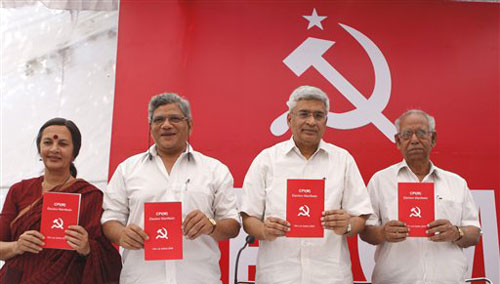
THE meeting of the working committee of CITU being held on July 15-17, 2010 at B T Ranadive Bhawan, New Delhi welcomes the decision taken by the national convention of workers called by almost all the central trade unions to go for countrywide general strike on September 7, 2010 against unprecedented price rise, rampant violation of labour laws, contractorisation of workforce, disinvestment of profit making public sectors and for provision of universal social security for unorganised sector workers. The convention was also participated by the representatives of several independent federations of state and central government employees, employees of banks, insurance, defence establishments and other services and establishments from all sectors of the economy.
It is unfortunate that despite remaining together in all the joint programmes held so far, and despite agreeing in principle for a countrywide general strike sometime in the first week of September 2010, BMS opted out at the last moment citing their organisational inconvenience. The national convention appealed to BMS for extending their support to the general strike on September 7.
The working committee notes that the present phase of all-in united movement is the culmination of decades-long united struggle by the trade union movement against the neoliberal policies and its fall out on the people. The ground created by such united struggles in the background of deepening economic crisis and resultant miseries faced by the workers and people has given rise to a situation where all the central trade unions in the country had to come together in the joint platform of struggle.
The united platform of struggles comprising the central trade unions and the employees federations covering almost all industries and services have already demonstrated their united resolve to fight and recorded their united protests against the anti-people policies and their fall out through “all india protest day on October 28, 2009, joint dharna before parliament on December 18, 2010 and countrywide jail bharo/satyagraha on March 5, 2010, which had drawn participation of several lakhs of the workers throughout the country.
But the government of the day appeared to remain totally unresponsive to the countrywide united protest action by the working class and has been going ahead with the same anti-people policies viz., steeply hiking the prices of kerosene, LPG, petrol and diesel again within a period of three months, allowing the employers class to rampantly violate labour laws and carrying on repression on trade union rights and pushing through the disinvestment process in the blue chip PSUs etc. The government has taken no step yet to augment the allocation for national security fund and has not yet removed the restriction of so called “poverty line” on the entitlement for the benefits under various social security/welfare schemes thereby throwing overwhelming majority of the unorganised sector workers outside the purview of those schemes.
Moreover, the government of the day has been arrogantly pushing through one after another measure on the economic policy front like allowing 100 per cent FDI on retail trade, free trade agreement with European Unions etc on the one hand and trying to impose drastic curtailment on trade union and social security rights of the workers through anti-workers changes in labour laws, privatisation of pension etc on the other which is going to have severe negative impact on the national economy and directly impact upon the life and livelihood of the mass of the working people.
In such a background the call for general strike on September 7, 2010 by the trade union movement of the country is the most important step towards heightening the united movement of the working class for a determined resistance struggle against the neoliberal policy regime.

No comments:
Post a Comment